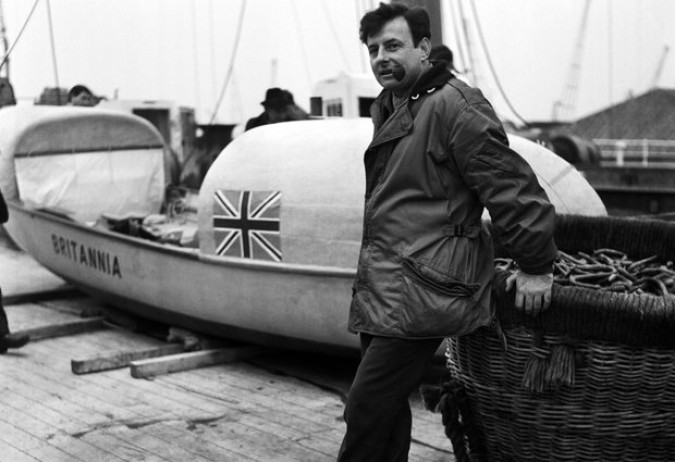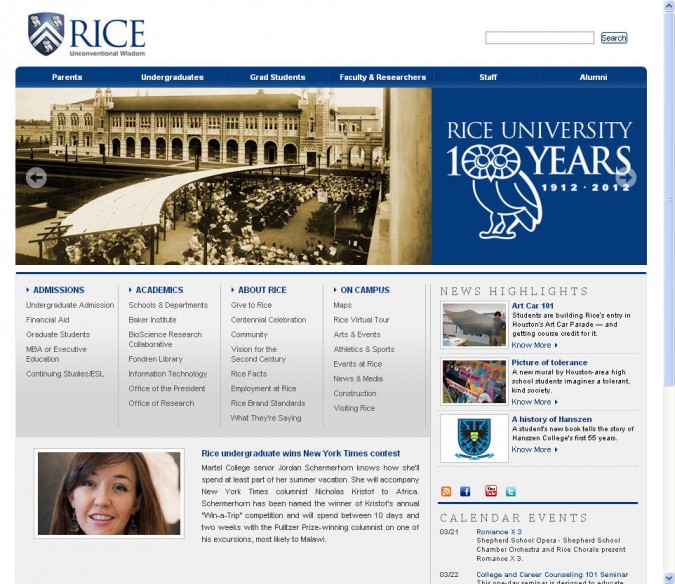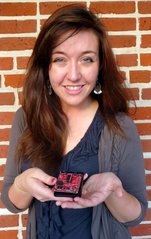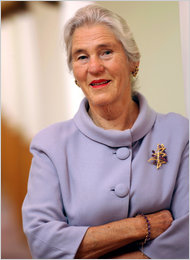Archive for the ‘The New York Times’ tag
Jordan Schermerhorn wins New York Times trip to Africa with columnist and blogger Nicholas Kristof
Here’s a great essay by undergraduate Rice University student Jordan Schermerhorn.
Schermerhorn wrote this engaging piece to try win a trip with New York Times newspaper columnist Nicholas Kristof.
I follow Kristof on Facebook, and that’s how I found Schermerhorn’s essay.
I am reprinting Schermerhorn’s essay in its entirety here because I don’t think she will object, given she wrote this knowing it could receive widespread public attention. Furthermore, this is not New York Times text, but Schermerhorn’s personal text. Of course I’ll remove this text if asked by Schermerhorn or The New York Times.
As you can see above, Rice University devoted prime space on the front of their website telling the world of Schermerhorn’s win.
According to the Rice story about Schermerhorn’s win, she will travel with Kristof to Africa and will blog for The New York Times during her trip. How exciting! I am really happy for her.
What Scermerhorn has written is inspiring and powerful. She’s a good writer. I predict she will do great things in life. Her heart is in the right place.
I identify strongly with what Schermerhorn has written.
I plan to tour the US and world in my super green 4 cylinder bus conversion to advance the idea that we can tread far more lightly on the planet with existing technologies if we would only change our perspective on what it means to be happy. I am exchanging heaps of easy cash I could make by writing code for established companies to pursue my desire to help save the world. I can get by just fine on the more modest cash I make working for myself and managing my investments. I can do this and write at the same time.
Scermerhorn says she wants to help her fellow classmates pursue their desires to change the world. She plans to help them by writing. She plans to show them how to avoid going to work for oil companies and consulting firms. She’s already on her way by winning this New York Times prize. Congratulations Jordan!
By Jordan Schermerhorn
Text appeared in The New York Times March 15, 2012
I remember, as most people probably do, the instant I realized the world was bigger than my hometown.
It’s all the fault of a high school science teacher. After having rarely left San Antonio, I ventured few horizon-shattering hours out to West Texas for an academic competition my senior year. The long roads and desert panoramas struck something in me, and I decided that it would be a good idea – or, at the very least, a good story – to repeat the adventure alone. A few weeks before leaving for university, with recklessness that only an eighteen year-old can manage, I took an early-morning drive out to Big Bend National Park, across from the Mexican border.
Wading knee-deep in the banks of the Rio Grande, I could see the village of Boquillas on the other side. The border within the park – formerly open to all travelers who dared to chance a makeshift gondola – closed after 9/11, and the town’s decay from lack of tourist revenue was evident even from such a distance. Cardboard with chicken-scratch Spanglish scattered the ground in strategic locations near signposts, beckoning those passing by to examine decorative walking sticks and tiny creatures of the desert sculpted from wire. “Please take,” they read. “Suggested donation $5.”
As I slept in my car that night, I couldn’t shake the feeling that I wasn’t doing enough: putting a few dollars under a rock was a way I could help, but it wasn’t the way for me to help. Leaving the next day I noticed my money was gone, and the wire scorpions had been replenished.
I arrived at Rice University shortly thereafter by the grace of a scholarship, hesitant but motivated, and eager to explore further. New friends from Indonesia and Pakistan threw me for a loop from which I’m still recovering. I chose to study bioengineering, a vague term that shifts in definition from institution to institution, but my passion for the past three years has been my minor: global health technologies.
I had been looking for years for a way to marry my feuding passions of science and policy, of writing and action. I feel extraordinarily lucky to have found a field that combines all of these things seamlessly: to participate in both diagnostic research and Model Arab League, and to grasp at the common ground between the two. For the past four months, I’ve been hard at work developing a low-cost monitoring system for apnea in premature infants. It’s rewarding – I’m not an electrical engineer, and I by no means knew how to program this time last year, but I’ve managed to help build a tool that can save lives. This kind of tinkering isn’t too complex, and it’s not out of reach.
But I still feel limited. I see my fellow students invest thousands of hours in capstone projects that can provide real and immediate help to those in need, only to abandon them in favor of more traditional pursuits after walking the stage. Medical school, graduate school, “real jobs” with oil companies and consulting firms: these are where many of my peers end up, and I don’t blame them. I know several who wish it were easier and less risky to drive forward with their makeshift syringe pumps, their diagnostic smartphone applications. They just don’t know how.
I’m looking for a way to communicate the potential for these ventures. I’d love to help demonstrate to students and budding entrepreneurs that there IS a vast set of untapped opportunities here to build, create, and implement solutions to complicated problems in the developing world. And I could help reach a nontraditional audience whose potential to improve lives remains largely untapped.
Engineers can’t write? It’s a classic stereotype, and one I hope I defy. I contribute articles for two student publications; I blog and tweet rampantly, receiving ironic in-person compliments on my Facebook posts. I love making things – but I love talking about them more, and getting people excited about making progress in global health.
Standing near the border four years ago is still the closest I’ve been to leaving the U.S. I’d like to cross it, this time, and use writing to bring others with me.
John Fairfax, renowned ocean rower, dies

John Fairfax with his Brittania row boat that he crossed the Atlantic Ocean in by himself in 1969. Fairfax was the first known person to accomplish this feat. He died February 8, 2012.
John Fairfax died February 8, 2012. I had never heard of Fairfax until today, when Reddit featured a link to his obituary in The New York Times newspaper entitled John Fairfax rowed across oceans.
Fairfax was the first known person to row a boat by themselves across the Atlantic Ocean. He accomplished this impressive feat in 1969.
In 1971 and 1972 he rowed across the Pacific Ocean with his girlfriend, Sylvia Cook. They became the first known pair to row across that ocean.
The obituary for Fairfax is colorfully written and entertaining. John Fairfax was quite an adventurer according to Brent Lang writing for The Wrap. Lang writes that Hollywood should make a movie about John Fairfax.
I’m impressed Fairfax was able to convince his girlfriend to row across an ocean in a rowboat. That gives me hope that I’ll be able to convince a woman to travel the world with me in my eco bus conversion, like my Facebook friend Herman Zapp is doing in his 1928 automobile.
A conversation with Janet D. Rowley
I went to elementary, middle and high school with Roger Rowley, now the Director of The Prichard Art Gallery at the University of Idaho. My mother Martha Warnock always told me what a smart mother he had. I remember this even from when I was a young child. My mother was a professor at the University of Chicago at the time, as was Janet Rowley, Roger’s mother.
Janet Rowley comes up in conversation with my mother even now, because Rowley has been recently featured in two publications my mother reads regularly, The New Yorker and The New York Times.
The New York Times article was published in the print edition February 8, 2011. Sadly, I didn’t properly file my original paper version of the very long and fascinating New Yorker article, and I can’t find it via the search mechanism at that magazine’s website, or via Google. I believe I have the article at my house, and if and when I find it, I’ll scan it and amend this post, because it was captivating.
My mother thinks Janet Rowley will win a Nobel Prize. Given what I’ve read about her, I’d say that’s likely.
I wonder if I perhaps met her when I was at Lab School with her son Roger. I remember Roger Rowley well and sat next to him at dinner at my high school reunion ten and a half years ago.
[Note: Roger Rowley wrote to me shortly after I posted the above text letting me know that the Internet address for The Prichard Art Gallery has been updated. Please visit the Prichard Art Gallery here instead of via the link above in the first sentence. January 7, 2012 @ 5:20pm PST.]



